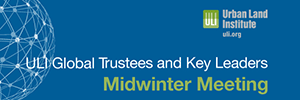While much of the day-to-day media coverage is spent on border conflicts and terror attacks both abroad and closer to home, Rik Kirkland, director of publishing and principal at consultancy McKinsey & Co., believes that one story has the potential to “change everything” between now and the year 2100.
Speaking at ULI’s Midwinter Meeting in Paris, Kirkland said, “The biggest story unfolding around us today is we’re witnessing the dawn of the era of machine learning and artificial intelligence.” Referring to the “Arab spring” of 2010–2011, Kirkland says we are approaching a similar revolution for artificial intelligence.
Related: Managers and machines: The new leadership equation
Kirkland, a former editor of Fortune, said that on June 6, 2011, IBM’s prototype Watson appeared on the television game show Jeopardy. Using natural language, Watson was able to outplay two human champions, says Kirkland, despite the use of wordplay, puns, and innuendo that is part of the show’s format. But in the past four years, the Watson concept can be accessed from cloud-based servers, with hundreds of instances of the program running at the same time on devices as small as a smartphone.
Combining digital cameras, lasers, and advanced sensors, Kirkland says there are now machines that can literally “see” as well as process changes to the physical world. Citing Google’s driverless car concept, he said, “Google has logged more than 1 million miles driven, accident and human free.” One of Watson’s implementations is finding signs of early-stage cancer in images that might be undetectable to even experienced human teams.
Kirkland cited Wired magazine’s Kevin Kelly as comparing artificial intelligence’s impact on inert objects as comparable to electrification. “Everything we formerly electrified,” said Kirkland quoting Kelly, “we will now cognitize.” Kirkland believes that more and more of the economy will be essentially autonomous, with machines talking to each other and taking appropriate action without human influence.
He pointed out that machines are already largely flying our planes. Machines could be sorting our packages, grading exams, and even writing the news. Kirkland says that the Associated Press announced last year that all of the future earnings announcements would be written by computers. Kirkland says he expects the construction industry to see productivity gains from more mechanical workers.
Kirkland says that while the first robots were large industrial-grade machines for manufacturing or single-purpose machines such as ATMs, the next generation, such as the prototype Baxter, can learn to do multiple jobs for less than the cost of one year’s salary for a minimum-wage worker.
While some are fearful that this will lead to jobs being destroyed, Kirkland remains hopeful, closing his remarks with a quote from economist David Landes, who wrote: “In this world, the optimists have it. Not because they are always right, but because they are positive. That is the way of achievement, correction, improvement, and success. Educated, eyes-open optimism pays.”






